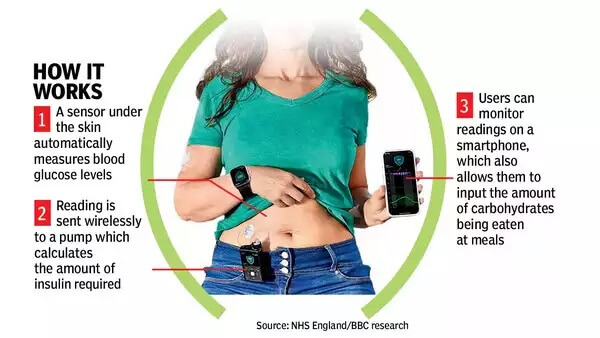Type 1 diabetes, also known as juvenile diabetes, is an autoimmune condition where the body’s immune system attacks the pancreas, gradually reducing and eventually halting insulin production. For individuals with this condition, an artificial pancreas could be transformative, addressing their insulin deficiency. The National Health Service (NHS) in England has developed such a device—a glucose sensor placed under the skin that continuously monitors insulin levels and operates with a pump to supply the required amount of insulin, functioning much like a natural pancreas. This innovation eliminates the need for daily insulin injections and frequent finger-prick blood tests, potentially benefiting millions of children worldwide.
Charlotte, a six-year-old from Lancashire, participated in a trial of this NHS technology, known as the hybrid closed-loop system, with life-changing results. Her mother, Ange Abbott, shared with the BBC that before using the loop, managing Charlotte’s diabetes was entirely manual. Nighttime required setting alarms every two hours for finger pricks and insulin adjustments to manage fluctuations in blood sugar. Children with type 1 diabetes face a heightened risk of hypoglycemia (dangerously low blood sugar levels) during the night. For the Abbott family, the artificial pancreas proved to be a remarkable improvement.
A 2022 study in The Lancet cited data from the International Diabetes Federation (IDF) Diabetes Atlas 2021, showing India has the highest number of children and adolescents with type 1 diabetes. Indian doctors are now endorsing local artificial pancreas solutions such as Medtronic India’s MiniMed 780G system, a closed-loop insulin pump featuring Bluetooth connectivity and real-time glucose monitoring, priced at approximately Rs 6 lakh.
Medical professionals highlight that artificial pancreas systems deliver better patient outcomes compared to traditional insulin management methods. This is primarily due to their ability to dispense insulin based on real-time blood glucose readings, significantly reducing the need for manual interventions such as finger pricks and injections. According to Dr. Sweta Budyal, a consultant endocrinologist and diabetologist at Mumbai’s Fortis Hospital, these pumps administer insulin as needed, resulting in lower overall insulin usage. This can help mitigate weight gain and, more importantly, leads to fewer instances of hypoglycemia while reducing the risk of complications such as cardiac issues, retinopathy, kidney disease, and neuropathy.
As reported by TOI, the NHS hybrid closed-loop system is an insulin-only setup that adjusts insulin delivery automatically based on continuous glucose monitor (CGM) readings, keeping blood sugar within target ranges. Users still need to input their carbohydrate intake and calculate insulin doses for meals and snacks. Other systems include the threshold-suspend function, which stops insulin delivery when blood sugar falls to a preset level, and the predictive-suspend system, which preemptively halts insulin delivery before blood sugar levels become too low.
Despite the benefits, the adoption of these devices remains limited. Dr. Budyal notes that the most basic insulin pump models start at Rs 2.5 lakh, with advanced models costing around Rs 6 lakh—a prohibitive price for most Indians. Even among those who can afford the technology, some find it intimidating or complicated to use. “People who are accustomed to daily insulin injections may prefer to stick to what they know,” she explains. Additionally, young patients who are self-conscious about their condition may avoid using the pump, as it is visible when worn with certain clothing, such as crop tops or sleeveless garments.
























